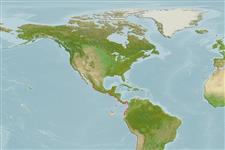Environment: milieu / climate zone / depth range / distribution range
Ecology
Marine; brackish; pelagic-neritic. Tropical; 27°N - 4°S
Eastern Central Pacific: Gulf of California to the northern tip of Peru.
Size / Weight / Age
Maturity: Lm ? range ? - ? cm
Max length : 11.5 cm TL male/unsexed; (Ref. 114986); common length : 6.0 cm SL male/unsexed; (Ref. 9336)
Dorsal spines (total): 0; Anal spines: 0; Anal soft rays: 43 - 48. Belly with around 26 scutes. Lower jaw not strongly projecting; hind tip of maxilla meets lower bulge of maxilla blade and is overlapped by it; teeth very small or minute. Dorsal fin well behind midpoint of body; anal fin long, its origin before dorsal fin origin. A silver band along flank.
Occurs in coastal waters and off river mouths (e.g. Río Mayo, Gulf of California) thus perhaps tolerating lowered salinities. Feeds on planktonic crustaceans. Spawns over an extended period off Costa Rica.
Life cycle and mating behavior
Maturities | Reproduction | Spawnings | Egg(s) | Fecundities | Larvae
Whitehead, P.J.P., 1985. FAO Species Catalogue. Vol. 7. Clupeoid fishes of the world (suborder Clupeoidei). An annotated and illustrated catalogue of the herrings, sardines, pilchards, sprats, shads, anchovies and wolf-herrings. FAO Fish. Synop. 125(7/1):1-303. Rome: FAO. (Ref. 188)
IUCN Red List Status (Ref. 130435)
Threat to humans
Harmless
Human uses
Fisheries: subsistence fisheries
Tools
Special reports
Download XML
Internet sources
Estimates based on models
Preferred temperature (Ref.
123201): 23.3 - 28.6, mean 26.9 °C (based on 38 cells).
Phylogenetic diversity index (Ref.
82804): PD
50 = 0.7500 [Uniqueness, from 0.5 = low to 2.0 = high].
Bayesian length-weight: a=0.00724 (0.00405 - 0.01297), b=3.14 (2.98 - 3.30), in cm total length, based on LWR estimates for this species & (Sub)family-body (Ref.
93245).
Trophic level (Ref.
69278): 3.8 ±0.59 se; based on food items.
Resilience (Ref.
120179): High, minimum population doubling time less than 15 months (Preliminary K or Fecundity.).
Fishing Vulnerability (Ref.
59153): Low vulnerability (10 of 100).
